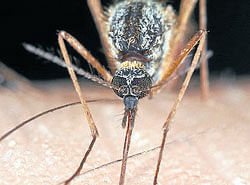Dengue virus increases mosquitoes' lust for blood
Mosquitoes are known as blood-sucking machines, but a new research has found that the dengue virus increases their lust for blood, allowing them to transmit the deadly virus to humans more effectively.

Researchers at the Johns Hopkins Bloomberg School of Public Health in the US found that dengue virus specifically turns on mosquito genes that make them hungrier for a blood meal; the activated genes also enhance mosquitoes’ sense of smell, something that likely improves their feeding skills.The result is a mosquito better able to serve the virus by carrying it more efficiently to human hosts.
“The virus may, therefore, facilitate the mosquito’s host-seeking ability, and could — at least theoretically — increase transmission efficiency, although we don’t fully understand the relationships between feeding efficiency and virus transmission,” study researcher George Dimopoulus was quoted as saying by LiveScience.
“In other words, a hungrier mosquito with a better ability to sense food is more likely to spread dengue virus.”
The virus doesn’t hurt the mosquitoes that carry it, a specific species called Aedes aegypti, but it lives in them. When the mosquito bites a human, it spreads the deadly disease through its saliva.
More than 2.5 billion people live in areas where dengue fever-infected mosquitoes live. The World Health Organisation estimates that between 50 million and 100 million dengue infections occur each year.
In the study, published in the journal PLoS Pathogens, the researchers analysed the mosquito genes before and after being infected with the virus, finding changes in 147 genes.
These post-infection genes make proteins that involved in processes that include virus transmission, immunity, blood feeding and host seeking, they found. “Our study shows that the dengue virus infects mosquito organs, the salivary glands and antennae that are essential for finding and feeding on a human host,” Dimopoulus said.Dimopoulus said: “This infection induces odorant-binding protein genes, which enable the mosquito to sense odours.
“We have, for the first time, shown that a human pathogen can modulate feeding-related genes and behaviour of its vector mosquito, and the impact of this on transmission of disease could be significant.”
This is just one of many recent examples of a parasite taking control of an animal for its own benefit.
Deccan Herald is on WhatsApp Channels| Join now for Breaking News & Editor's Picks